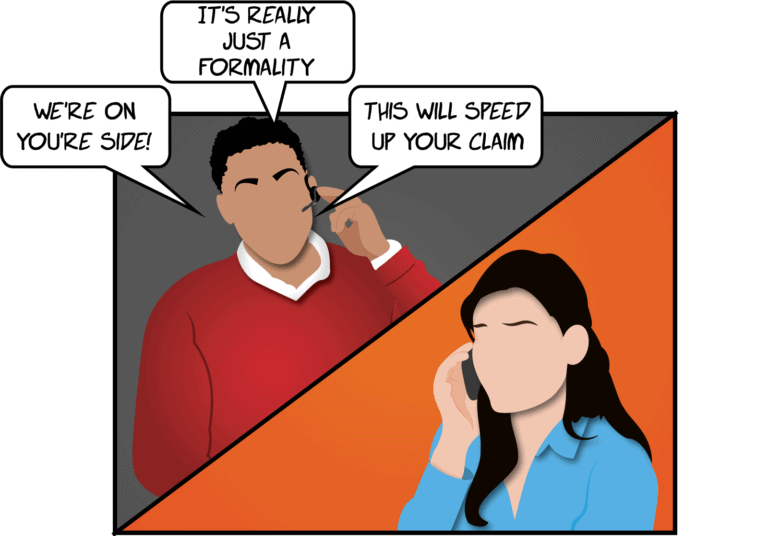Snellings Law PLLC Attorneys are Personal Injury Trial Lawyers
Silence is Golden
Why you shouldn’t give recorded statements to insurance companies.
How many times have you watched a police drama and found yourself talking to the screen? An innocent character with nothing to hide is tripped-up by supposedly casual questioning while you yell at the TV, “Just wait for your lawyer to get there!”
Those are good instincts – maybe you should be an attorney.
Relying upon caution and counsel are good strategies during an interrogation. The same is true after being injured in an accident. In both instances, you have the right to remain silent.

You are not obligated to give a recorded statement to the at-fault driver’s insurance — no matter what agents or adjusters might tell you. As for your own insurance company, many contracts do require you to “cooperate” by providing a statement, but you can still hold off on providing that statement until you have had time to process the crash, fully understand your injuries and retain a qualified personal injury lawyer.
Insurers may pressure you to go on the record with friendly statements like, “We’re on your side”, “It’s just a formality”, or, “This will help speed up your claim”. Instead, politely decline and allow your personal injury lawyer to handle all discussions with the insurance companies.
There is nothing to gain from providing a statement and many ways that it can go wrong.
This isn’t about deception or dishonesty, just being careful and protecting your rights. A helpful civilian speaking with a trained investigator may unknowingly create ambiguity or say things that can later be twisted.
- Apologies: It’s normal to express general regret or mention things you might have done differently, even when an accident is caused by another driver. Portrayed in another light, this natural empathy can be used to shift blame towards you.
- Injury assessment: Most people are optimistic and don’t like to complain, so they downplay physical difficulties when speaking to others. Such pleasantries can be weaponized to undermine the truth of lingering issues or refute problems that are diagnosed later.
- Recollections: Memories can be hazy following the trauma of an accident, causing temporary confusion or prompting us to fill in uncertain parts of events. When providing official information, it’s important to stick with simple, definite facts; any minor inaccuracy may be used to impeach your entire testimony. Written statements make this easier.

Remember that insurance companies – including your own – are multibillion-dollar corporations more dedicated to profits than clients. Even an agent who seems sympathetic is operating on their own agenda.
Such concerns are stressors you don’t need while recovering from injury. That’s why we’re here…to take care of everything else so you can focus on healing.
Once you retain a personal injury lawyer, we become your point of contact and the gatekeeper of your information. We’ll work with you to solidify facts, prepare accurate statements, and manage medical records while preserving your rights and ensuring that you receive justice.
You don’t need to be an expert on litigation – that’s our job.
For more helpful tips on how to handle the aftermath of an auto accident and avoid common errors that may undermine your injury claim, download our free personal injury survival guide here.
Be careful, stay safe, and remember “mum’s the word” if investigators want to record you.
Free Strategy Session Reveals How To Avoid the Traps Insurance Companies Set for Victims to Destroy Claims.
How it works:
- Call us now or give us your basic information in the Free Strategy Session box
- If your case is something we cannot help you with, we will do our best to get you the information of someone who can.
- If we can potentially help you, we will schedule a Free Strategy Session
There is zero obligation. We want all injury victims to understand their rights and the process.
After your Free Strategy Session, you will understand where insurance companies can set traps for you and what needs to be done to avoid these traps. You will also understand the personal injury process as well as how we can help, or if you need the help of an attorney. The strategy session typically will have one of three outcomes. You:
- Decide to move forward with our law firm.
- Decide to think about it, and we will be available to answer your questions.
- Say, “I’ve got this,” and decide you do not need an attorney.
Again, there is zero obligation and you will be informed and understand your rights and the process. We want to arm you with knowledge to avoid the traps insurance companies set to harm your claim.

